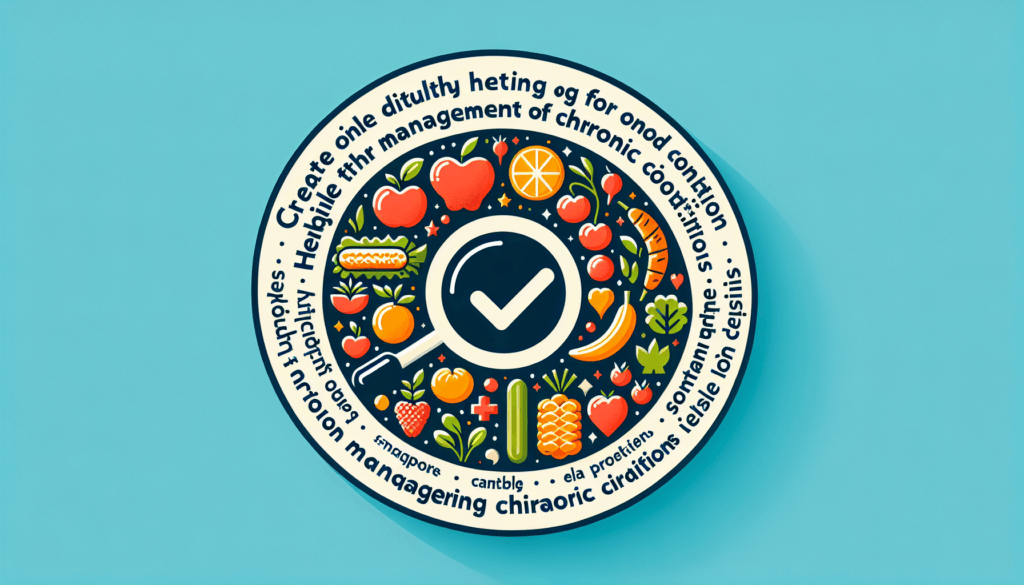Are you a baby boomer looking to manage your chronic conditions through dietary changes? In this article, we will explore the essential dietary recommendations tailored specifically for boomers dealing with long-term health issues. From heart disease to diabetes, these recommendations will help you make informed choices about your nutrition, ensuring a healthier and more fulfilling life. Get ready to take charge of your health and discover the power of a well-balanced diet.

Cardiovascular Health
Reduce Sodium Intake
When it comes to cardiovascular health, one important dietary recommendation is to reduce your sodium intake. This is because high sodium intake has been linked to an increased risk of high blood pressure, which is a major risk factor for heart disease. To reduce your sodium intake, opt for low-sodium or no-salt-added options when purchasing packaged foods. Additionally, try to cook meals at home using natural herbs and spices to enhance flavor instead of relying on salt.
Increase Omega-3 Fatty Acid Consumption
Another dietary recommendation for cardiovascular health is to increase your consumption of omega-3 fatty acids. These healthy fats have been shown to reduce inflammation, lower triglyceride levels, and decrease the risk of heart disease. You can find omega-3 fatty acids in fatty fish like salmon and trout, as well as in walnuts, flaxseeds, and chia seeds. Consider incorporating these foods into your diet to support a healthy heart.
Include Fiber-Rich Foods
Fiber is also important for cardiovascular health. Consuming an adequate amount of fiber can help lower cholesterol levels and maintain a healthy weight, both of which are crucial for heart health. Include fiber-rich foods such as fruits, vegetables, whole grains, and legumes in your daily meals. These foods not only provide essential nutrients but also promote a healthy cardiovascular system.
Diabetes Management
Control Carbohydrate Intake
For individuals managing diabetes, controlling carbohydrate intake is a key dietary recommendation. Carbohydrates can significantly affect blood sugar levels, so it’s important to choose carbohydrates wisely and monitor portion sizes. Opt for complex carbohydrates such as whole grains, fruits, and vegetables, which are digested more slowly and have a smaller impact on blood glucose levels compared to simple carbohydrates like sugary snacks and refined grains.
Choose Low Glycemic Index Foods
In addition to managing carbohydrate intake, it’s beneficial to choose low glycemic index (GI) foods. The GI is a measure of how quickly a specific food raises blood sugar levels. Foods with a low GI are digested more slowly, resulting in a more gradual rise in blood sugar levels. Some examples of low GI foods include whole grains, legumes, non-starchy vegetables, and certain fruits. Including these foods in your diet can help better manage blood glucose levels.
Monitor Portion Sizes
Monitoring portion sizes is also crucial for diabetes management. Eating large portions can lead to excessive calorie intake and cause blood sugar levels to spike. Use measuring cups, a food scale, or visual cues to ensure you’re consuming appropriate portion sizes. This can help maintain blood sugar control and support overall diabetes management.
Osteoporosis Prevention
Ensure Adequate Calcium and Vitamin D Intake
To prevent osteoporosis, it’s essential to ensure adequate intake of calcium and vitamin D. Calcium is crucial for maintaining strong bones, while vitamin D helps the body absorb calcium. Good sources of calcium include dairy products, leafy green vegetables, and fortified foods. Vitamin D can be obtained from sunlight exposure, fatty fish like salmon, and fortified dairy or plant-based milk products. Aim to include these nutrients in your diet to support bone health.
Include Vitamin K-Rich Foods
In addition to calcium and vitamin D, including vitamin K-rich foods can also contribute to osteoporosis prevention. Vitamin K is involved in bone metabolism and helps to maintain bone density. Foods rich in vitamin K include leafy green vegetables, broccoli, and Brussels sprouts. Consider incorporating these foods into your diet to support optimal bone health.
Limit Alcohol and Caffeine Consumption
Limiting alcohol and caffeine consumption is another important aspect of osteoporosis prevention. Excessive alcohol intake and high caffeine consumption have been associated with a higher risk of bone loss and an increased likelihood of fractures. It’s recommended to moderate your alcohol intake and limit caffeine consumption to a moderate amount, such as one to two cups of coffee per day.
Weight Management
Monitoring Caloric Intake
When it comes to weight management, monitoring your caloric intake is crucial. Consuming more calories than your body needs can lead to weight gain, while consuming fewer calories than your body needs can result in weight loss. To maintain a healthy weight, calculate your daily calorie needs based on age, sex, activity level, and weight goals. Keep track of your daily calorie intake and adjust portion sizes or food choices accordingly.
Emphasize Nutrient-Dense Foods
In addition to monitoring calories, it’s important to emphasize nutrient-dense foods in your diet. Nutrient-dense foods provide a high amount of essential nutrients relative to the number of calories they contain. These foods include fruits, vegetables, whole grains, lean proteins, and healthy fats. Emphasizing nutrient-dense foods can help you meet your nutritional needs while managing your weight.
Engage in Regular Physical Activity
Physical activity is a crucial component of weight management. Regular exercise not only burns calories but also helps build lean muscle mass, which can increase metabolism and support weight loss. Aim for at least 150 minutes of moderate-intensity aerobic activity or 75 minutes of vigorous-intensity aerobic activity each week. Incorporate activities you enjoy, such as brisk walking, cycling, swimming, or dancing, to make exercise a fun and sustainable part of your routine.

Digestive Health
Increase Fiber Intake
To maintain optimal digestive health, it’s important to increase your fiber intake. Fiber adds bulk to stool, making it easier to pass through the digestive tract, and helps prevent constipation. Good sources of fiber include fruits, vegetables, whole grains, legumes, and nuts. Aim to incorporate a variety of fiber-rich foods into your diet to support regular bowel movements and overall digestive health.
Stay Hydrated
Staying hydrated is another vital aspect of digestive health. Drinking an adequate amount of water helps soften stool and promote regular bowel movements. Aim to drink at least eight cups (64 ounces) of water per day, or more if you engage in physical activity or live in a hot climate. Other beverages such as herbal tea, decaffeinated coffee, and diluted fruit juices can also contribute to your daily hydration goals.
Limit Intake of Fatty and Processed Foods
To maintain optimal digestive health, it’s important to limit the intake of fatty and processed foods. These foods can be harder to digest and may contribute to digestive issues such as bloating, diarrhea, and indigestion. Opt for lean proteins, whole grains, fruits, and vegetables instead. These foods provide essential nutrients and support a healthy digestive system.
Hypertension Management
Limit Sodium Intake
Managing hypertension involves limiting sodium intake. Excessive sodium intake can raise blood pressure and put a strain on the cardiovascular system. To reduce sodium intake, avoid processed and packaged foods that are typically high in sodium. Opt for fresh or minimally processed foods instead and use herbs and spices to add flavor to your meals.
Increase Consumption of Potassium-Rich Foods
Increasing consumption of potassium-rich foods is also important for hypertension management. Potassium helps counteract the effects of sodium on blood pressure and promotes vasodilation. Good sources of potassium include bananas, oranges, avocados, leafy green vegetables, and legumes. Including these foods in your diet can help maintain healthy blood pressure levels.
Maintain a Healthy Weight
Maintaining a healthy weight is another key aspect of hypertension management. Excess weight puts additional strain on the cardiovascular system and can lead to elevated blood pressure. Adopting a balanced diet and engaging in regular physical activity are important for weight management. Strive for a body mass index (BMI) within the normal range to support optimal blood pressure control.

Arthritis Relief
Include Anti-inflammatory Foods
To relieve arthritis symptoms, it’s beneficial to include anti-inflammatory foods in your diet. Chronic inflammation plays a role in the progression of arthritis and can contribute to pain and joint stiffness. Foods rich in anti-inflammatory compounds include fatty fish like salmon, fruits, vegetables, whole grains, nuts, and seeds. These foods can help manage inflammation and provide relief for arthritis symptoms.
Consume Omega-3 Fatty Acids
Omega-3 fatty acids have also been shown to provide relief for arthritis symptoms. These healthy fats have anti-inflammatory properties and can help reduce joint pain and stiffness. Sources of omega-3 fatty acids include fatty fish like salmon and sardines, walnuts, flaxseeds, and chia seeds. Consider incorporating these foods into your diet to support joint health.
Maintain a Healthy Weight
Maintaining a healthy weight is crucial for arthritis relief. Excess weight can put additional strain on the joints, leading to increased pain and discomfort. By adopting a balanced diet and engaging in regular physical activity, you can not only manage your weight but also improve joint function and reduce arthritis symptoms.
Cognitive Function
Include Antioxidant-Rich Foods
To support cognitive function, it’s important to include antioxidant-rich foods in your diet. Antioxidants help protect the brain from oxidative stress and inflammation, which are associated with cognitive decline. Good sources of antioxidants include berries, dark chocolate, green leafy vegetables, and nuts. Incorporating these foods into your diet can help maintain and support cognitive function.
Consume Omega-3 Fatty Acids
Omega-3 fatty acids are also beneficial for cognitive function. These healthy fats are important for brain health and have been linked to improved memory and cognitive performance. Include fatty fish like salmon, mackerel, and trout in your diet, as well as walnuts, flaxseeds, and chia seeds. These foods provide a rich source of omega-3 fatty acids to support optimal brain function.
Maintain a Balanced Diet
Maintaining a balanced diet is key to supporting overall cognitive function. A varied and nutrient-rich diet provides the necessary vitamins, minerals, and antioxidants to support brain health. Include a variety of fruits, vegetables, whole grains, lean proteins, and healthy fats in your meals to ensure you’re obtaining all the nutrients your brain needs to function at its best.

Vision Health
Consume Foods Rich in Vitamins C and E
To support vision health, it’s important to consume foods rich in vitamins C and E. These vitamins act as antioxidants and help protect the eyes from damage caused by free radicals. Good sources of vitamin C include citrus fruits, berries, and bell peppers. Vitamin E can be found in nuts, seeds, and vegetable oils. Including these foods in your diet can help promote healthy vision.
Include Lutein and Zeaxanthin-Rich Foods
Lutein and zeaxanthin are carotenoids that have been specifically associated with eye health. These pigments accumulate in the retina and can help protect against age-related macular degeneration and cataracts. Foods rich in lutein and zeaxanthin include leafy green vegetables like spinach, kale, and collard greens, as well as eggs and corn. Consider incorporating these foods into your diet for optimal eye health.
Limit Foods High in Saturated and Trans Fat
Limiting foods high in saturated and trans fat is also important for vision health. These fats have been associated with an increased risk of developing age-related macular degeneration. Opt for healthier fats like those found in fatty fish, nuts, seeds, and olive oil. Limit your intake of fried foods, processed snacks, high-fat dairy products, and fatty cuts of meat to support optimal vision.
Gut Health
Include Probiotic-Rich Foods
To support gut health, it’s important to include probiotic-rich foods in your diet. Probiotics are beneficial bacteria that help maintain a balanced gut microbiome and promote digestive health. Foods like yogurt, kefir, sauerkraut, and kimchi contain live cultures of these beneficial bacteria. Including these foods in your diet can help support a healthy gut.
Increase Consumption of Prebiotic Foods
In addition to probiotics, increasing consumption of prebiotic foods is important for gut health. Prebiotics are dietary fibers that serve as food for the beneficial bacteria in your gut. Examples of prebiotic-rich foods include onions, garlic, bananas, asparagus, and whole grains. Including these foods in your diet can help nourish the good bacteria in your gut and support optimal digestive function.
Avoid Foods with Artificial Sweeteners
Avoiding foods with artificial sweeteners is another important aspect of gut health. Artificial sweeteners, such as aspartame and sucralose, have been shown to disrupt the gut microbiome and may contribute to digestive issues. Opt for natural sweeteners like honey, maple syrup, or stevia instead. It’s also important to read food labels carefully to identify any hidden sources of artificial sweeteners.
In conclusion, managing chronic conditions requires attention to diet, and incorporating the dietary recommendations mentioned above can have a significant impact on maintaining and improving health. By reducing sodium intake, increasing consumption of beneficial nutrients like omega-3 fatty acids and fiber, and making smart choices regarding portion sizes and food quality, you can take proactive steps towards managing chronic conditions and optimizing your overall well-being. Remember, a friendly and balanced approach to your diet is the key to a healthier and happier life.



